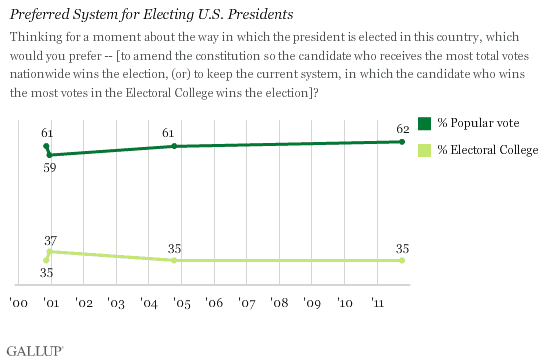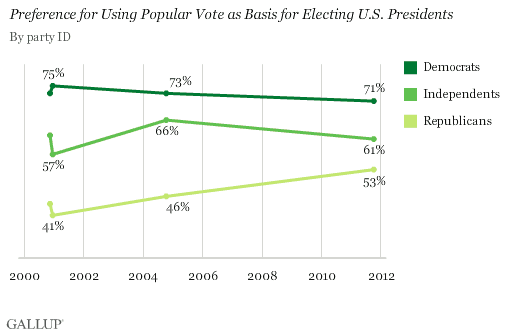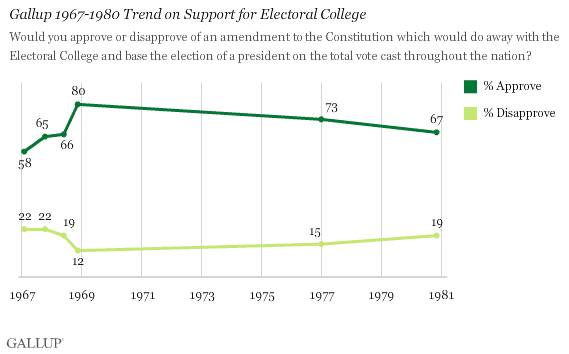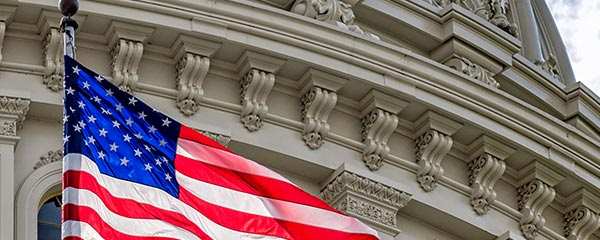PRINCETON, NJ -- Nearly 11 years after the 2000 presidential election brought the idiosyncrasies of the United States' Electoral College into full view, 62% of Americans say they would amend the U.S. Constitution to replace that system for electing presidents with a popular vote system. Barely a third, 35%, say they would keep the Electoral College.

Gallup's initial measure of support for the Electoral College with this wording was conducted in the first few days after the 2000 presidential election in which the winner remained undeclared pending a recount in Florida. At that time, it was already clear that Democratic candidate Al Gore had won the national popular vote over Republican George W. Bush, but that the winner of the election would be the one who received Florida's 25 Electoral College votes.
During this period, Democrats were much more likely than Republicans to favor replacing the Electoral College system with a popular vote system. In a Gallup poll conducted Dec. 15-17 -- shortly after the Dec. 12 Supreme Court decision that ended the Florida recount, thereby deciding the election in Bush's favor -- 75% of Democrats said they would amend the Constitution so that the candidate who receives the most votes nationwide wins. By contrast, 56% of Republicans favored keeping the Electoral College, while 41% favored replacing it with a popular vote system.
Republicans have grown somewhat more amenable to adopting a popular vote system over the past decade. Now, for the first time since 2000, the majority of Republicans favor it. Independents are not quite as supportive as Democrats of the popular vote system, but the majority of them have consistently favored it.

Additionally, Gallup finds little difference in the views of Americans of various age groups on changing how the country elects presidents. Support for amending the Constitution on this matter is 58% among 18- to 34-year-olds, 64% among 35-to 54-year-olds, and 62% among those 55 and older.
Americans' Support for Popular Vote System Predates 2000
From 1967 through 1980, Gallup periodically asked Americans about replacing the Electoral College with a popular vote system using different question wording, and each time, the majority favored it. The issue was particularly relevant during this period because the popular vote in the 1968 and 1976 presidential elections was so closely divided.

Notably, in November 1980, when 67% of Americans, overall, said they approved of an amendment that would change the electoral system, Gallup found little partisan disagreement. Support was 62% among Republicans, 66% among Democrats, and 73% among independents. This suggests that the partisan results seen more recently may result from the political dynamic of the 2000 election, in which the Republican candidate benefited from the Electoral College system at the Democrat's expense.
Bottom Line
With 62% of Americans today in favor of abolishing the Electoral College, Americans show relatively little attachment to this unique invention of the country's Founding Fathers. The system was devised as a compromise between those who wanted Congress to select the president and those who favored election by the people, and it has resulted in a highly state-based approach to presidential campaigning.
Those who advocate abolishing the Electoral College often do so on the basis that the system puts undue emphasis on a small number of swing states. Whether Americans as a whole are concerned about that byproduct is unclear. However, they broadly agree that the country should adopt a system in which the popular vote prevails. While Republicans are less supportive of this than Democrats, 11 years after the 2000 election politicized the issue, the majority of Republicans once again favor the change.
Survey Methods
Results for this Gallup poll are based on telephone interviews conducted Oct. 6-9, 2011, with a random sample of 1,005 adults, aged 18 and older, living in all 50 U.S. states and the District of Columbia.
For results based on the total sample of national adults, one can say with 95% confidence that the maximum margin of sampling error is ±4 percentage points.
Interviews are conducted with respondents on landline telephones and cellular phones, with interviews conducted in Spanish for respondents who are primarily Spanish-speaking. Each sample includes a minimum quota of 400 cell phone respondents and 600 landline respondents per 1,000 national adults, with additional minimum quotas among landline respondents by region. Landline telephone numbers are chosen at random among listed telephone numbers. Cell phone numbers are selected using random-digit-dial methods. Landline respondents are chosen at random within each household on the basis of which member had the most recent birthday.
Samples are weighted by gender, age, race, Hispanic ethnicity, education, region, adults in the household, and phone status (cell phone only/landline only/both, cell phone mostly, and having an unlisted landline number). Demographic weighting targets are based on the March 2010 Current Population Survey figures for the aged 18 and older non-institutionalized population living in U.S. telephone households. All reported margins of sampling error include the computed design effects for weighting and sample design.
In addition to sampling error, question wording and practical difficulties in conducting surveys can introduce error or bias into the findings of public opinion polls.
View methodology, full question results, and trend data.
For more details on Gallup's polling methodology, visit www.gallup.com.
